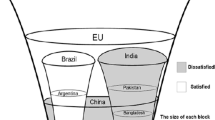Abstract
Multi-party coalitions are an increasingly common type of government across different political regimes and world regions. Since they are the locus of national foreign-policy-making, the dynamics of coalition government have significant implications for International Relations. Despite this growing significance, the foreign-policy-making of coalition governments is only partly understood. This symposium advances the study of coalition foreign policy in three closely related ways. First, it brings together in one place the state of the art in research on coalition foreign policy. Second, the symposium pushes the boundaries of our knowledge on four dimensions that are key to a comprehensive research agenda on coalition foreign policy: the foreign-policy outputs of multi-party coalitions; the process of foreign-policy-making in different types of coalitions; coalition foreign policy in the ‘Global South’; and coalition dynamics in non-democratic settings. Finally, the symposium puts forward promising avenues for further research by emphasising, for instance, the value of theory-guided comparative research that employs multi-method strategies and transcends the space of Western European parliamentary democracies.
Similar content being viewed by others
References
Beasley, R. and Kaarbo, J. (2014) ‘Explaining extremity in the foreign policies of parliamentary democracies’, International Studies Quarterly 58(4): 729–740.
Bejar, S., Mukherjee, B. and Moore, W.H. (2011) ‘Time horizons matter: The hazard rate of coalition governments and the size of government’, Economics of Governance 12(3): 201–235.
Blondel, J. and Müller-Rommel, F. (1993) ‘Introduction’, in J. Blondel and F. Müller-Rommel (eds.) Governing Together. The Extent and Limits of Joint Decision-Making in Western European Cabinets, New York: St. Martin’s Press, pp.1–19.
Clare, J. (2010) ‘Ideological fractionalization and the international conflict behavior of parliamentary democracies’, International Studies Quarterly 54(4): 965–987.
Diamond, L. (2002) ‘Thinking about hybrid regimes’, Journal of Democracy 13(2): 21–35.
Gallagher, M., Laver, M. and Mair, P. (2006) Representative Government in Modern Europe, Boston, Mass.: McGraw-Hill.
Hagan, J. (1993) Political Opposition and Foreign Policy in Comparative Perspective, Boulder, Col.: Lynne Rienner.
Hagan, J., Everts, P., Fukui, H. and Stempel, J. (2001) ‘Foreign policy by coalition. deadlock, compromise, and anarchy’, International Studies Review 3(2): 169–216.
Kaarbo, J. (1996) ‘Power and influence in foreign policy decision making: The role of junior coalition partners in German and Israeli foreign policy’, International Studies Quarterly 40(4): 501–530.
Kaarbo, J. (2012) Coalition Politics and Cabinet Decision Making. A Comparative Analysis of Foreign Policy Choices, Ann Arbor, Mich.: University of Michigan Press.
Kisangani, E. and Pickering, J. (2011) ‘Democratic accountability and diversionary force: Regime types and the use of benevolent and hostile military force’, Journal of Conflict Resolution 55(6): 1021–1046.
Oktay, S. (2014) ‘Constraining or enabling? The effects of government composition on international commitments’, Journal of European Public Policy 21(6): 860–884.
Oppermann, K. and Brummer K. (2014) ‘Patterns of junior partner influence on the foreign policy of coalition governments’, British Journal of Politics and International Relations 16(4): 555–571.
Ozkecici-Taner, B. (2005) ‘The impact of institutionalized ideas in coalition foreign policy making: Turkey as an example, 1991–2002’, Foreign Policy Analysis 1(3): 249–278.
Strøm, K., Müller, W. and Bergman, T. (eds.) (2008) Cabinets and Coalition Bargaining: The Democratic Life Cycle in Western Europe, Oxford: Oxford University Press.
Wigell, M. (2008) ‘Mapping ‘hybrid regimes’: Regime types and concepts in Comparative Politics’, Democratization 15(2): 230–250.
Author information
Authors and Affiliations
Corresponding author
Rights and permissions
About this article
Cite this article
oppermann, k., kaarbo, j. & brummer, k. introduction: coalition politics and foreign policy. Eur Polit Sci 16, 457–462 (2017). https://doi.org/10.1057/s41304-016-0064-9
Published:
Issue Date:
DOI: https://doi.org/10.1057/s41304-016-0064-9




